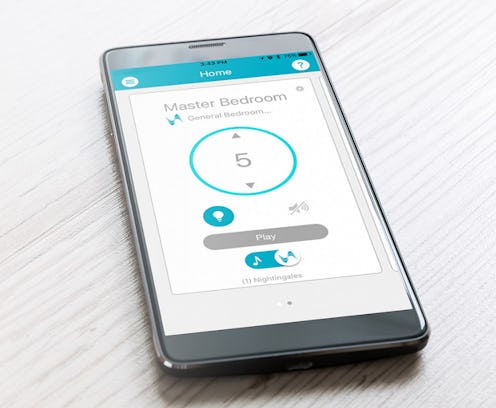Because you're probably dragging today thanks to daylight saving time, someone decided that you deserve a nap and created National Napping Day. Additionally, if you're not sleeping well at night, and you want to get the most of your snooze time, this sleep system and app called Nightingale can help you sleep. It's not a coincidence that National Napping Day on Mar. 12 comes so soon after the dreaded beginning of Daylight Saving Time on Mar. 11 — it's because sleep is probably the only thing you're craving. Aside from coffee, of course.
National Napping day also falls during Sleep Awareness Week, and the National Sleep Foundation even has a calculator for the occasion that can help you get the most out of your bed time. However, if you're tried pretty much everything to get to sleep, but you're still staring at the ceiling at 3 a.m., or you are unable to fall asleep during nap time, you might want to try the Nightingale smart home sleep system. This genius invention is a device that pairs with an app to mask noise and create customized ambient sounds called "sound blankets," which are going to be your new favorite kind of blanket.
According to a clinical trial with Harvard Medical School, Nightingale reported findings that "sound blankets" can help people fall asleep faster, stay asleep longer, and significantly improve sleep quality. "In an experimental model of transient insomnia, exposure to the Nightingale smart home sleep system significantly reduced sleep onset latency by 38 percent compared to normal environmental noise in a group of healthy subjects," the study concluded. "This reduction in the time to fall asleep equals that of commonly prescribed sleep medications."
This is a good option if you're afraid sleep medications will make you groggy, or even sleep walk (I am totally afraid). Another downside to prescription sleep meds is that you can build up a tolerance to them over time, which means they might not work as well. "As a non-pharmaceutical alternative and, most of all, with technological advancements, evidence is accumulating in support of a role for broadband sound administration to mask environmental noise disturbances," the study explained. "Noise disturbances from sources either inside or outside the home are common sources of problems with sleep initiation and maintenance."
In the study, which was conducted over almost 400 nights, participants reported a 64-percent decrease in noise-related wake occurrences and a 26-percent increase in overall sleep quality. If you live in a noisy urban area, not waking up every time there's a street scuffle or an animal knocking over your trashcans sounds pretty great. Nightingale masks common sleep-disruptive noises like music, TV, talking, and freeway traffic.
If you have a roommate on a different schedule than you, being able to sleep through their late night shenanigans could make your living situation more bearable and reduce your impulse to scream into your pillow.
While many people might feel that they need total silence to fall asleep and stay asleep, the benefit of a product like Nightingale creating a sound blanket is that the ambient sound, while subtle, stays consistent; changes in noise won't startle you while you sleep, and ultimately rouse you. Instead, your mind will simply be able to tune out everything, and you'll get a good night's sleep out of it.
Sleeping issues of all sorts are extremely common — often, they can be caused by stress, or even just genetic predispositions — so it's good to know that there are systems like Nightingale beginning to pop up to help people win their battle for a good night's sleep.
